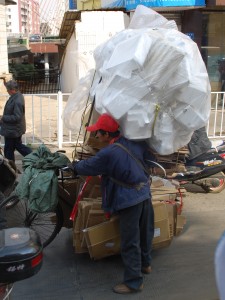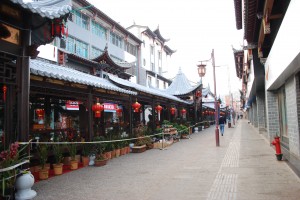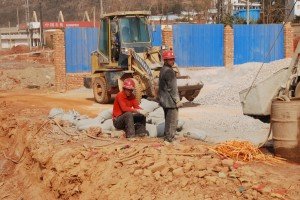Culture shock. Perhaps the most cliché and overly talked-about experiences of living abroad (and with good reason), it can be – in whatever form it presents itself – both incredibly amusing and downright frustrating. One thing is true however it may tickle you: cultural differences are the reality when studying abroad, however appalling or alien they are from your own. And that reality can be stressful for the pampered, germaphobic American who, for instance, is not used to squatter toilets or the concept of spitting in public. Of course I refer half-ashamedly to myself.

Places to go, things to do, all on bicycle
Culture shock is synonymous with travel, no matter where you go. After one month in Yunnan Province, China, I am still mesmerized at the many different ways one can hock a loogey. Rural or urban location; Han Chinese or ethnic minority; morning or night; young or old: it is perfectly acceptable to expel your phlegm (and whatever other inner demons may be troubling you) in public. My first week in China can be described as a kind of dance: tiptoeing and skipping along the pavement to avoid those appetizing regurgitated blots. I’ve since learned not to care about (or look at) what might be cradling the soles of my shoes at the end of the day. The sniff-gurgle-hock-patooey sound has become all too familiar; joining the constant rumble of nearby construction and your everyday Chinese boisterousness, these colorful sounds harmonize in a way only rapidly-industrializing and evolving 21st century China can.

A central marketplace in Tonghai, Yunnan Province. A rare quiet (without spitting noises) before the hustle and bustle of morning.
There are a number of other superficial cultural kinks that keep me pondering late into the evening. Squatter toilets never cease to fascinate: after an entire month, I still lack the skills necessary to sufficiently do my business. The messy consequences of unpracticed use aside, squatter toilets promote very healthy anatomical posture and flexibility (I bet you didn’t know that. Or immediately consider it, anyway.) In many ways, they work better than western toilets. The Chinese assume the squatting position in everyday leisure activities as well; whenever one is eating, waiting for the bus or simply relaxing without a chair nearby, they will squat. It is a common, almost calming sight in parks and along the streets.

One of the more unsightly squatter toilets I've encountered.
Beyond the superficial layer of China’s culture lie many things that continue to faze me. Guanxi, the infamous concept of personal networking to snag career opportunities, is the glue that connects China’s businesses and social ladders together. It is a private, unregulated and common practice not without consequences. Confucianism, China’s predominant ideology until the debilitating Cultural Revolution, has made a questionable recent resurgence. The traditional family unit that once consisted of three generations or more is rapidly changing in light of the One Child Policy, industrialization, and the displacement of migrant workers from their rural families. Finally, China’s 55 ethnic minorities – 25 of which are found in Yunnan Province alone – have long experienced discrimination and poverty. The Chinese government’s recent efforts to bring modern technology, policy-making, and jobs to these populations have been profound, albeit still lacking.

Construction is seemingly everywhere in China
Clearly, there is much to study. These are issues China faces as it spirals unpredictably into the 21st century: issues originating from many academic disciplines. This, along with my interests in Mandarin (China’s official language, spoken by the majority of the population), Chinese calligraphy, history, and Tibetan Buddhism are why I have journeyed to Yunnan Province, China. Amazing food, squatter toilets, odd customs, and a multitude of sociopolitical and cultural issues chose my destination for me. This is education through experience: not just a classroom.

Why travel? The answer is obvious.
